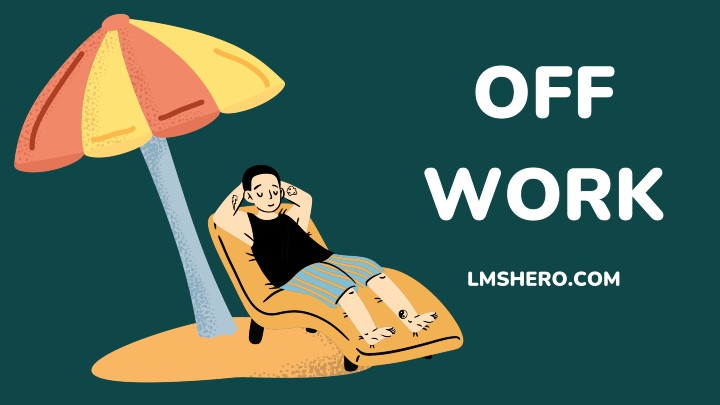As a common term generally used in describing employees that are not working, the phrase “off work” can mean different things.
From taking personal time off to finishing the day at the office, the phrase “off work” serves as a quick response to various work-related queries.
This article explores why employees ask to be off work and answers important questions about taking time off.
What does off-work mean?
Off work generally means an employee has taken to be absent from the office.
Such an employee will temporarily be unable to perform official duties during that time off. This language or phrase is mainly found in official emails like leave applications or business emails.
Is off work the same as a suspension?
No, being away from work is not the same as a suspension. Suspension can best be defined as when an employee is asked not to show up to work or perform official duties but remains employed.
Disciplinary action remains the major reason for suspension and can include violence, insubordination, or violation of company policies.
Employees on suspension due to these reasons typically receive pay unless their contract does not state it.
Can being off work lead to termination?
Yes, sometimes being away from work for three or more days without permission can lead to termination.
For example, an employee takes time away from work but refuses to return within the stipulated time.
Such employees have violated their leave agreement and can be punished with a termination of employment.
What are the reasons for being off work?
Reasons for being away from the office can range from urgent reasons such as sickness or accident of the employee to paid holiday, among others. Let us take a closer look at some of these reasons below.

Emergencies
Emergencies regarding family safety or health are valid reasons to take time off.
For example, your child being sick is a valid excuse to stay home and monitor your kid’s health. Family emergencies can extend from your children to your siblings, spouse, and parents.
Health reasons
Sickness or health complications are valid reasons for taking time off work. However, most employers require that you have an appointment with a doctor or some proof to validate your reason.
Employees who wish to take time off from the office due to health issues can call in sick or are sometimes required to send a mail. Upon resumption, some employers demand a doctor’s note to confirm you were sick.
Mental health rejuvenation
Ever had one of those days at the office where your stress levels are so high that you can’t think clearly and be productive? Overworking and frustration at the office tend to have that effect.
The best way to counter this effect is by taking a few days off duty to rest and maintain great mental health conditions. Taking time off to preserve your mental health will prevent you from suffering an emotional or mental breakdown.
Unplanned circumstances
Once in a while, you might need to take time off because of an urgent matter at home or other unplanned events. Such situations make it necessary for you to request a leave of absence from the office.
Planned Schedules
You can also take time off work for planned events as long as you give due notice to the company.
These planned activities may include monthly health checkups, dentist appointments, attending family social events, or educational training.
Sabbatical & Paid Holidays
These paid holidays you are entitled to can be used for study or leisure purposes like tourism. Paid holidays include national holidays that do not require users to come to the office, like Christmas, New Year’s Day, Easter, or Independence Day.
However, the number of paid holidays you can embark on depends on your company or employer. This is because some employers do not acknowledge some holidays and require that their employees come to the office on those days.
How many days off work is acceptable?
There are no amount of days deemed acceptable for you to miss work.
The amount of days you can stay away from the office depends on your employer. While there is no certain duration, the number of days can range from three days to three months.
However, this is only the case if stated in your employment contract. Permissible days you can be away from the office also vary across organizations, with some employers offering more days and others offering fewer.
It is also at your employer’s discretion whether these days would be considered paid time off. Some employers offer benefits and sick leave, but others do not and will deduct it from your paycheck.
What are the benefits of being off duty?
Numerous benefits of taking time off work include gaining a better work/life balance, improved relationships with loved ones, and mental rehabilitation. It also helps you renew your focus and reduce your tension or stress levels.
Difference between off-work and out of work
“Off work” refers to when an employee is temporarily away from the office while being out of work means being unemployed. People who are out of work are either recently unemployed or unable to obtain a job.
Conditions that can result in being out of a job include having a criminal record, health disability (physical or mental), or lacking the required skills to secure a job.
FAQs
Do you receive pay during time off from the office?
Yes. You are entitled to pay under certain circumstances when you take time off work.
This employee-provided benefit may cover sick, vacations, or maternity leave, among other reasons. However, not all employers offer these benefits, and allowed reasons may vary.
Is working from home also considered off-work?
No, they are different.
Working from home means you’re still performing your official duties, but remotely while off work, you’re temporarily away from your duties.
Why do people work from home?
People choose remote jobs to boost their productivity, have a better work-life balance, or because they can’t cope with commuting long distances to the office.
Conclusion
“Off work” can generally depict being absent from the office, i.e., closing for the day, running an errand, or going on retreats. However, its major use in employment cycles is when an employee is away from performing official duties for some time.
As mentioned above, reasons for being away from the office can range from family emergencies to vacation, maternity leave, stress management, and sick leave.
Also, being off work is different from being out of work. While one depicts time off from the office or your official duties, the other depicts unemployment.
I hope you found this article helpful. You can also read about the qualities of a good employee. Thanks for reading.






